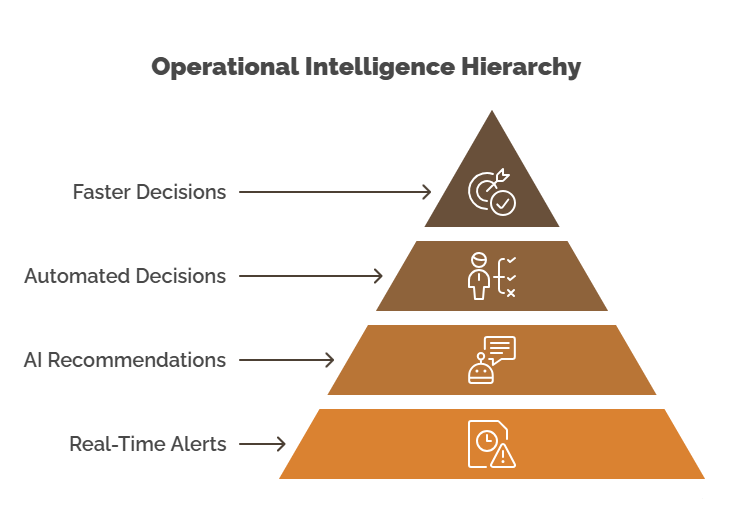Intro: Why “Smart” Isn’t Smart Enough Anymore
For small and mid-sized businesses (SMBs), digital tools have opened up incredible possibilities. From automated workflows to centralized systems, businesses are more connected than ever before. Yet, a common frustration persists: despite having loads of data and “smart” dashboards, decision-making still feels… slow. Uncertain. Reactive.
The reality is, access to data isn’t the same as acting on it. Most SMBs suffer from what’s called decision latency—the lag between insight and action. And that lag is costly.
Enter Operational Intelligence (OI)—a powerful new layer within modern ERP systems that bridges this critical gap. It’s not just about collecting data anymore. It’s about empowering your business to confidently act in real-time, with the help of AI that understands context, calculates risk, and continuously learns.
This blog explores how Operational Intelligence is transforming ERP systems into decision-making engines—and why SMBs can’t afford to ignore it.
What Is Decision Latency—and Why Is It Your Silent Growth Killer?
We all know the frustration of sitting on a pile of reports, knowing something is off, but not being sure what to do about it. That gap between identifying a problem and actually making a decision? That’s decision latency.
For small and medium-sized enterprises, decision-latency translates into missed opportunities, delayed reactions to operational problems, and such an overall feeling of lagging behind while in possession of data already. Traditional ERP systems may tell you what has happened but stop short of genuinely helping you decide on what to do next or on how serious the issue really is.
Operational Intelligence changes that. It shrinks decision latency by:
- Delivering real-time alerts when thresholds are breached
- Providing AI-backed recommendations with context
- Automating low-risk decisions so your team can focus on complex ones
The result? A tighter loop between insight and action. Which means faster decisions, fewer errors, and better outcomes.
The Hidden Decision Traps SMBs Face
Let’s be honest—having too much information can be just as paralyzing as having too little. Many SMBs fall into invisible decision traps that hurt performance over time. Here are four common ones:
- Cognitive Overload: Your dashboards are filled with numbers, but your team can’t see what truly matters. When every metric seems urgent, nothing gets prioritized.
- Analysis Paralysis: The fear of making the wrong choice leads to no choice at all. Teams second-guess the data because it lacks clear direction or confidence levels.
- Untrackable Decisions: Ever wonder why a certain purchase or pricing change was made? If your decisions aren’t documented or linked to data, there’s no accountability or learning.
- Intuition Over Intelligence: When systems don’t provide clear guidance, people rely on gut feeling. Sometimes that works. But in high-stakes moments, that’s a risky bet.
Operational Intelligence is built to counter these traps. With features like confidence scores, explainable AI, and decision journaling, your ERP becomes a system that not only highlights problems—but helps your team act on them confidently and with transparency.
Operational Blind Spots: Where SMBs Fail Without Knowing It
Sometimes, the biggest threats to your business are the ones you don’t even notice. These are called operational blind spots—hidden inefficiencies, trends, or risks that don’t show up in standard reports. They live in the gaps between departments, in misaligned incentives, or in signals that are too subtle for traditional tools to catch. Examples include:
- Promotional campaigns that increase sales but erode margins
- Missed buying patterns from niche but high-value customers
- Return rate spikes that signal product issues—but only after it’s too late
Operational Intelligence uses AI and machine learning to surface patterns your team might miss. By analyzing thousands of variables in real-time, OI can highlight trends that would otherwise go unnoticed. More importantly, it connects these patterns to actual business impact—so you know not just what’s happening, but why it matters.
Real-World Snapshot: What OI Looks Like in Action
A mid-sized outdoor gear retailer faced an ongoing issue: high return rates on winter jackets, despite growing sales. The team initially blamed sizing issues and adjusted their manufacturing specs—yet the returns kept rising.
After implementing an Operational Intelligence module within their ERP, the AI highlighted a less obvious pattern: bundled promotional discounts were encouraging customers to over-order and return the unused items. Jackets were being purchased just to meet discount thresholds, then returned post-campaign.
By adjusting the promotion design and bundling strategy, the company reduced returns by 28% within a month and preserved over $60,000 in margin loss. The insight had been hiding in plain sight—but only surfaced when the system connected promotions, returns, and margin metrics.
Confidence-Based Decision Support: The Future of ERP Intelligence
In a world of AI-driven insights, it’s not just about what your ERP tells you—it’s about how confident the system is in its own recommendations.
Modern Operational Intelligence frameworks include confidence scoring—a feature that evaluates how likely a recommended action is to deliver the intended outcome. Think of it like your ERP saying, “I’m 92% sure this reorder quantity will prevent stockouts without overstocking.”
This allows your team to:
- Prioritize high-confidence actions
- Review and adjust medium-confidence ones
- Investigate or override low-confidence suggestions
Confidence-based decision support builds trust in the system while keeping humans in the loop. It’s the perfect balance between automation and oversight.
Operational Intelligence as a Culture Shift, Not Just a Tech Shift
Here’s a truth most vendors won’t tell you: adopting Operational Intelligence isn’t just about plugging in a smarter ERP. It’s a cultural shift. For OI to succeed, your organization must:
- Trust AI-generated suggestions enough to use them
- Let go of the “gut feeling” culture and embrace data as a decision ally
- Align leadership around metrics-based performance
This doesn’t happen overnight. It requires internal champions, cross-functional training, and a willingness to test and learn.
But once that shift happens, your business becomes more resilient, adaptive, and confident in its decisions—no matter what the market throws at you.
Self-Assessment: Is Your Business Ready for Operational Intelligence?
Ask yourself the following questions to assess your OI readiness:
- Do we currently track how accurate our operational decisions are over time?
- Can our ERP system provide real-time insights with confidence scoring?
- Are we comfortable automating decisions in areas like procurement or forecasting?
- Do our current dashboards lead to action—or just more questions?
- Is our team willing to trust system-generated suggestions and learn from outcomes?
If you answered “no” to more than two of these, Operational Intelligence might be exactly what your business needs to level up.
Integrating OI Without Breaking Your Business
You don’t need to rip out your existing ERP to start using Operational Intelligence. In fact, the smartest SMBs take a phased approach that builds confidence over time.
Here’s how:
- Map your decision-heavy processes: Identify the areas where delays or inconsistencies hurt the most—inventory, pricing, fulfillment.
- Create OI “sandboxes”: Run AI-driven recommendations alongside your current process to test accuracy without affecting live operations.
- Automate low-risk decisions: Start with reorders or forecast-driven restocks—where errors are low-cost and learning is high.
- Use human feedback to train the system: Your ERP should learn from accepted or rejected recommendations to improve over time.
This approach lets you scale intelligence progressively, without overwhelming your team or risking operations.
Red Flags That Your ERP Isn’t Ready for OI
Not every ERP system is equipped for Operational Intelligence. If you see these signs, it may be time for an upgrade:
- No built-in AI capabilities
- No ability to assign confidence levels to recommendations
- Lack of real-time processing and alerts
- No tracking or journaling of decisions made
- Poor integration with operational data sources
If your system lacks these, you’re not getting the full value of your data—or your team’s time.
The ROI of Confidence: Measuring Success Beyond Speed
Traditional ROI metrics like speed, headcount, or cost savings are still important—but Operational Intelligence brings a deeper layer of value.
Here’s how you measure it:
- Decision accuracy: Are your choices leading to better outcomes?
- Confidence alignment: Are your team’s actions matching the system’s high-confidence suggestions?
- Lower intervention: Are more decisions being handled autonomously with success?
- Revenue from insights: Are blind spots being turned into profit opportunities?
When you start measuring these, you realize that OI isn’t just about efficiency—it’s about making your entire operation smarter and more profitable.
Conclusion: Don’t Just Automate—Think Operationally Intelligent
Automation was step one. The next frontier is intelligence.
Operational Intelligence gives SMBs a superpower: the ability to see clearly, act quickly, and trust that the decisions being made—whether by human or machine—are the right ones.
In a fast-moving world, guessing isn’t good enough. ERP systems need to think, not just record. They need to recommend, not just report.
Operational Intelligence doesn’t just make your systems smarter—it makes your people more confident. And that, more than any feature or integration, is the real transformation.
Ready to unlock the intelligence hiding inside your operations? Let’s build the future of decision-making—together.
Take the First Step Towards Transformation
Effectively manage your financials, multiple channel inventory, and production workflows with our award-winning ERP.
Let Versa Cloud ERP do the heavy lifting for you.
Do Business on the Move!
Make your businesses hassle-free and cut the heavyweights sign up for the Versa Cloud ERP today!!
Join our Versa Community and be Future-ready with us.









